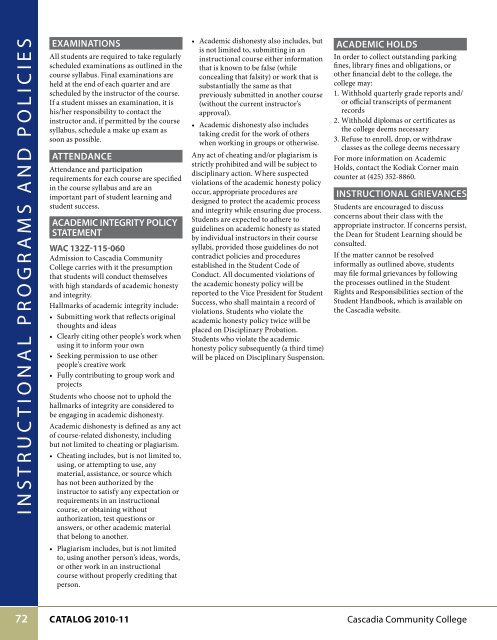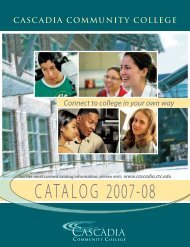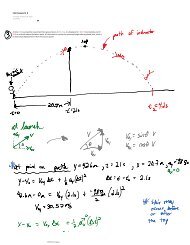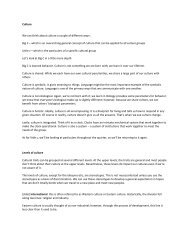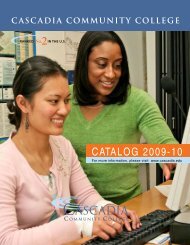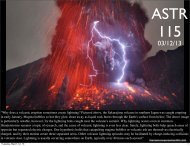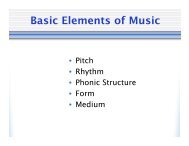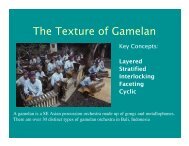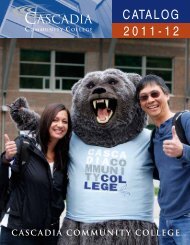CATALOG 2010-11 - Cascadia Community College
CATALOG 2010-11 - Cascadia Community College
CATALOG 2010-11 - Cascadia Community College
- No tags were found...
Create successful ePaper yourself
Turn your PDF publications into a flip-book with our unique Google optimized e-Paper software.
Instructional Programs AND PoliciesExaminationsAll students are required to take regularlyscheduled examinations as outlined in thecourse syllabus. Final examinations areheld at the end of each quarter and arescheduled by the instructor of the course.If a student misses an examination, it ishis/her responsibility to contact theinstructor and, if permitted by the coursesyllabus, schedule a make up exam assoon as possible.AttendanceAttendance and participationrequirements for each course are specifiedin the course syllabus and are animportant part of student learning andstudent success.Academic Integrity PolicyStatementWAC 132Z-<strong>11</strong>5-060Admission to <strong>Cascadia</strong> <strong>Community</strong><strong>College</strong> carries with it the presumptionthat students will conduct themselveswith high standards of academic honestyand integrity.Hallmarks of academic integrity include:• Submitting work that reflects originalthoughts and ideas• Clearly citing other people’s work whenusing it to inform your own• Seeking permission to use otherpeople’s creative work• Fully contributing to group work andprojectsStudents who choose not to uphold thehallmarks of integrity are considered tobe engaging in academic dishonesty.Academic dishonesty is defined as any actof course-related dishonesty, includingbut not limited to cheating or plagiarism.• Cheating includes, but is not limited to,using, or attempting to use, anymaterial, assistance, or source whichhas not been authorized by theinstructor to satisfy any expectation orrequirements in an instructionalcourse, or obtaining withoutauthorization, test questions oranswers, or other academic materialthat belong to another.• Plagiarism includes, but is not limitedto, using another person’s ideas, words,or other work in an instructionalcourse without properly crediting thatperson.• Academic dishonesty also includes, butis not limited to, submitting in aninstructional course either informationthat is known to be false (whileconcealing that falsity) or work that issubstantially the same as thatpreviously submitted in another course(without the current instructor’sapproval).• Academic dishonesty also includestaking credit for the work of otherswhen working in groups or otherwise.Any act of cheating and/or plagiarism isstrictly prohibited and will be subject todisciplinary action. Where suspectedviolations of the academic honesty policyoccur, appropriate procedures aredesigned to protect the academic processand integrity while ensuring due process.Students are expected to adhere toguidelines on academic honesty as statedby individual instructors in their coursesyllabi, provided those guidelines do notcontradict policies and proceduresestablished in the Student Code ofConduct. All documented violations ofthe academic honesty policy will bereported to the Vice President for StudentSuccess, who shall maintain a record ofviolations. Students who violate theacademic honesty policy twice will beplaced on Disciplinary Probation.Students who violate the academichonesty policy subsequently (a third time)will be placed on Disciplinary Suspension.Academic HoldsIn order to collect outstanding parkingfines, library fines and obligations, orother financial debt to the college, thecollege may:1. Withhold quarterly grade reports and/or official transcripts of permanentrecords2. Withhold diplomas or certificates asthe college deems necessary3. Refuse to enroll, drop, or withdrawclasses as the college deems necessaryFor more information on AcademicHolds, contact the Kodiak Corner maincounter at (425) 352-8860.Instructional GrievancesStudents are encouraged to discussconcerns about their class with theappropriate instructor. If concerns persist,the Dean for Student Learning should beconsulted.If the matter cannot be resolvedinformally as outlined above, studentsmay file formal grievances by followingthe processes outlined in the StudentRights and Responsibilities section of theStudent Handbook, which is available onthe <strong>Cascadia</strong> website.72 Catalog <strong>2010</strong>-<strong>11</strong> <strong>Cascadia</strong> <strong>Community</strong> <strong>College</strong>


